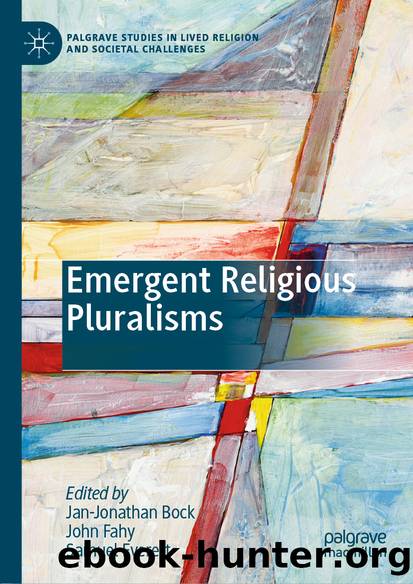Emergent Religious Pluralisms by Unknown

Author:Unknown
Language: eng
Format: epub
ISBN: 9783030138110
Publisher: Springer International Publishing
The Movement to Lived Religious Pluralism and How We Can Identify It
Recognition is a concept in political philosophy that can be readily applied to lived religious interactions between people of different religions . Recognition is at the heart of religious pluralism , both in legal recognition as discussed earlier and in mutual recognition at the microsocial level. In English, we use the word ârecognitionâ in two ways. One use means to detect and identify; for example, I recognise that that is a tree, and I recognise that you are a human being. The other use means to respect and value, that I recognise you as a person, so I treat you as a person ought to be treated. This second meaning has interested some philosophers, who note that human societies have extensive rules and expectations about how we should treat other people (Taylor 1994; Honneth 1995, 2002, 2008, 2012). Many recognition norms are not written down, but through life experience we come to know what expectations we are meant to have of each other. To name just a few of the myriad recognition norms into which we are socialised, we learn the appropriate ways to greet people, how to respond to someone who is honest and someone who is dishonest, and how we should respect other peopleâs property. In practice , recognition means that I recognise that you are a human being and that I recognise that as a human being you deserve to be treated in certain positive ways, and, therefore, I have moral obligations to you. Recognition also means that if I act according to societyâs expectations, I receive recognition from others, which affirms my inclusion in society. The largely unspoken social contract is that if we follow the norms, we will receive recognition from others for acting properly.
Receiving recognition is crucial to social inclusion and to personal self-image. Individuals can become members of society, Honneth (2002, 2008) states, only through the experience of mutual recognition in which they learn to internalise culturally specific norms of recognition and learn what kinds of expectations they can have of others. We know we belong in a community when we receive recognition from members of that community, and, in practice , we are a member of that community only through mutual recognition . All social groups are bound together by recognition, and a religious community is united not just in their shared doctrine but in their recognition of their shared faith and membership. Christians talk about The Church, the Body of Christ or the priesthood of all believers. Buddhists speak of the Sangha and Muslims of the Ummah. These terms denote a shared identity and heritage and, importantly, a shared destiny. Members of religious communities in their lived religion share a transcendent teleology and eschatology and a mutual recognition among members of the community of their shared destiny that helps explain the tendency in religion towards the worldview of exclusivism .
Mutual recognition within a community is essential for that community to
Download
This site does not store any files on its server. We only index and link to content provided by other sites. Please contact the content providers to delete copyright contents if any and email us, we'll remove relevant links or contents immediately.
The Lost Art of Listening by Michael P. Nichols(7506)
Why I Am Not A Calvinist by Dr. Peter S. Ruckman(4153)
The Rosicrucians by Christopher McIntosh(3521)
Wicca: a guide for the solitary practitioner by Scott Cunningham(3179)
Signature in the Cell: DNA and the Evidence for Intelligent Design by Stephen C. Meyer(3138)
Real Sex by Lauren F. Winner(3023)
The Holy Spirit by Billy Graham(2953)
To Light a Sacred Flame by Silver RavenWolf(2823)
The End of Faith by Sam Harris(2742)
The Gnostic Gospels by Pagels Elaine(2531)
Waking Up by Sam Harris(2461)
Nine Parts of Desire by Geraldine Brooks(2369)
Jesus by Paul Johnson(2363)
Devil, The by Almond Philip C(2333)
The God delusion by Richard Dawkins(2309)
Heavens on Earth by Michael Shermer(2285)
Kundalini by Gopi Krishna(2185)
Chosen by God by R. C. Sproul(2165)
The Nature of Consciousness by Rupert Spira(2108)
